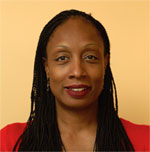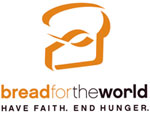Fighting food insecurity - one church at a time
By Melissa Muhammad | Last updated: Dec 22, 2010 - 5:09:53 PMWhat's your opinion on this article?

FinalCall.com News Focus: Food, Farming & Black Survival

LaVida Davis
|
On any given day, in any urban area, long lines can be seen of people waiting to get served from food pantries.
The Christian-based organization Bread for the World recently rolled out another leg in its national campaign to end hunger at Trinity United Church of Christ on Chicago's south side.
The gathering was the first of a planned series of forums and meetings intended to link Black churches across the country with the anti-hunger campaign.
The group's goal is twofold, one to address food insecurity in the Black community and two to lay the foundation for impacting the 2012 Farm Bill.

|
This forum “will be the first of many” as we look at some of the issues concerning food insecurity, it “should have two tiers--one on the ground, the other to fight policy,” said Ms. Davis, who moderated the session.
Among topics discussed were problems with food access, problems tied to the lack of healthy food available and food insecurity in the Black community.
Everything from food production, distribution, consumption and its links to health was discussed during the Nov. 5-6 weekend sessions.
Ms. Rowe, of the USDA, shared insights and observations from traveling the country and looking at different food programs.
“We are currently serving 1 in 4 Americans” with food subsidies, said Ms. Rowe. A majority of those fed are children and “34 percent of African-American children” live “in families that struggle to put food on the table,” she said.
Ninety percent of Black children will receive SNAP (Supplemental Nutrition Assistance Program) benefits at some point before reaching the age of 20, compared to 49 percent of all children in the U.S., she noted.
Though food subsidies are being provided, mothers, in particular, often don't know how to prepare food or maintain its nutritional value, she added.
The discussion gained momentum when the focus turned to food distribution and availability. Ms. Redmond has long been a proponent of “food justice” in urban areas.
“Where did the term ‘food desert' come from? We should unlearn the term. A ‘desert' is an independent, self-sustaining, ecological system. That is not the situation in urban areas. What we have here is ‘food injustice,' from an unjust food system created over the past few centuries,” said Ms. Redmond.
A repeated possible solution cited to increase availability to healthy food and increase access to food were urban gardens.
Fred Carter, of the Healthy Food Hub, which is committed to fostering young farmers, says small community gardens aren't the true solution to food injustices plaguing Blacks.
“If we get stuck on farmer's markets, we are going to starve,” he said. “We should be talking about an alternative food system. We have to develop diversity in our food system—one (company) produces three brands. Our food system is just like an auto production line—that system came from the automotive (industry).”
The food system Americans rely on is globally insecure and unsustainable, he said.
“Food is not White or Black. All of us are trapped in this paradigm. This is beyond race,” Mr. Carter said.
His remarks opened the door for discussion of the next year's farm bill and how the Black community, through the Black church, can affect federal policy.
The Farm Bill of 2012 is one of the largest budgets in U.S. policy making, second only to defense spending.
According to an April article on the Huffington Post, published just after the first hearing on the bill, “the Farm Bill of 2012 is the main piece of legislation that every five years establishes our nation's food and agriculture policy. The Farm Bill affects farm payments, supplemental nutrition assistance programs (SNAP, formally called food stamps), international trade, conservation programs, the opportunities in rural communities, agriculture research, food safety, and more. Currently 70 percent of farm payments go to the wealthiest 10 percent of producers of corn, soybeans, wheat, cotton and rice.”
Panelists agreed organizing and galvanizing Blacks to ensure the community receives its fair share of farm bill priorities and funding is vital. Elements of the bill could impact urban farmers, community gardens and small business owners that serve the communities with quality grocery stores, said panelists.
INSIDE STORIES AND REVIEWS
-
-
About Harriett ... and the Negro Hollywood Road Show
By Rabiah Muhammad, Guest Columnist » Full Story -
Skepticism greets Jay-Z, NFL talk of inspiring change
By Bryan 18X Crawford and Richard B. Muhammad The Final Call Newspaper @TheFinalCall » Full Story -
The painful problem of Black girls and suicide
By Charlene Muhammad -National Correspondent- » Full Story -
Exploitation of Innocence - Report: Perceptions, policies hurting Black girls
By Charlene Muhammad -National Correspondent- » Full Story -
Big Ballin: Big ideas fuel a father’s Big Baller Brand and brash business sense
By Bryan Crawford -Contributing Writer- » Full Story






 Click Here Stay Connected!
Click Here Stay Connected!








